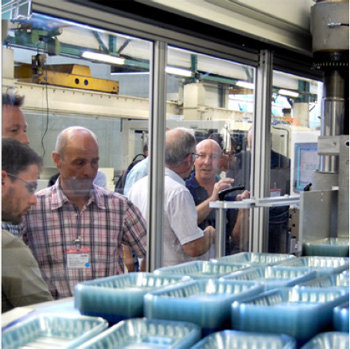At ILLIG's "Open House" trade show held on July 5th and 6th on the company's premises in Heilbronn, visitors were afforded a detailed glimpse of the technology and performance capabilities of the current line-up of automatic roll-fed thermoforming machines. Expert presentations of the state of the art, aimed at the Germanspeaking part of the specialized audience on Day 1 of the event and at professionals from abroad on the following day, were in each case supplemented by numerous equipment demonstrations.
Live exhibits included RDK and RDM-K Series machines with combined forming and punching action, RDKP, RV and RD Series units featuring separate forming and punching, plus one BF Series machine suitable for thermoforming products with distinctively undercut external contours. In order to give a representative view of the broad range of packaging items obtainable by thermoforming today, the machines were displayed under operating conditions, i.e., making a variety of cups, trays and hinged packs as well as lids and undercut packaging articles from common packaging materials (PS, PP and A-PET). In all, over 180 industry professionals attended the show, which was held for the 11th time.
 At the 11th Open House at ILLIG's site in Heilbronn, attendees learnt about the innovations
on current RDK, RDKP, RDM-K, RV and RD Series automatic roll-fed thermoforming
machines through plenum presentations before proceeding to examine real-life equipment in small groups. Photo: ILLIG
At the 11th Open House at ILLIG's site in Heilbronn, attendees learnt about the innovations
on current RDK, RDKP, RDM-K, RV and RD Series automatic roll-fed thermoforming
machines through plenum presentations before proceeding to examine real-life equipment in small groups. Photo: ILLIG
The majority of attendees came from West and East European market regions, but some customers had travelled from as far as South America and Asia to gain information on the current state of performance in thermoforming technology.
Innovations boost operating convenience and process stability while saving energy - all in conjunction with high productivity In their plenum presentations, ILLIG's experts described the innovations embodied in the current 3rd generation of all-servomotor powered machines on exhibit - including new features designed to simplify operator tasks and the start-up with new molds, process optimizing designs for enhanced process stability even at high number of cycles, and new subassemblies yielding further energy savings on the thermoforming line. Thus, for instance, the new control concept providing dynamic process optimization on RDK and RDKP machines takes a substantial load off the machine operator. Personnel no longer requires any special expertise regarding the interdependence of parameters to be optimized since the control system will automatically calculate the best settings automatically for every station of the line. Likewise, in the event of a change in settings, the cycle time is instantly recalculated and adjusted so that the maximum number of cycles (high productivity) will be ensured at all times. Moreover, a new start-up regime based on a reduced cycle rate and process-optimized settings (sas-up: self-adaptive start-up) provides a distinct reduction in stock consumption in the start-up phase after starting up new molds. When the line is switched to production mode, it automatically changes to high cycle rates and the appropriate heater output so that the stock will be uniformly heated to the optimum molding temperature.
The energy balance of these servomotor-driven machines, which are already highly efficient, can be further improved through the use of innovative surface heater elements for heating the stock. Featuring a special black glazing, the new HTSs heating elements consume around one-third less energy - on any machine type - than the standard FSR heater elements still widely employed in practice today. Further energy efficiency gains are achieved via the new low-maintenance vacuum pump which operates without oil. Thanks to its superior efficiency, it consumes around 15% less power than the pump type previously employed.
A now available compensating-type control system balances out the effects of variable environmental influences as commonly encountered during production. The continuous automatic adjustment of heater output temperatures and/or heating times ensures a uniformly high product quality. Moreover, the alternating (A/B) stacker system which is now servomotor-driven on RDK and RDKP Series machines cuts tooling costs while raising the process reliability at high cycle rates. A characteristic feature common to all 3rd generation thermoforming machines is that the new alternating stacker supports stacking of A/B moldings at up to 45 cycles per minute with full process stability.